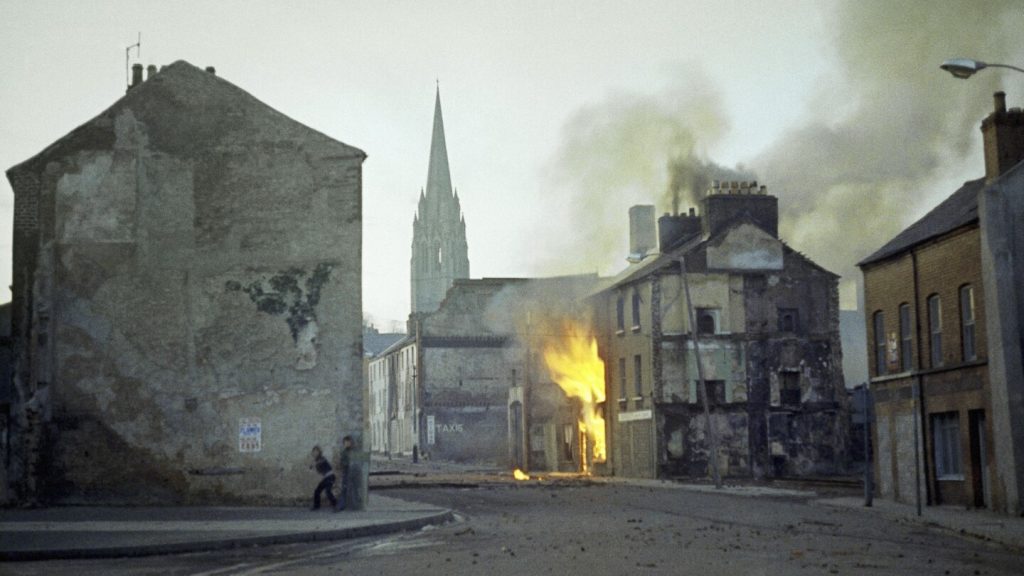LONDON (AP) — For over fifty years, the families of the victims and survivors of the 1972 Bloody Sunday have sought justice after British troops opened fire, resulting in the deaths of 13 unarmed civil rights marchers and injuring 15 others in Northern Ireland. Despite their prolonged efforts, no one has yet been held accountable in a court of law.
This situation may soon change, as a former British soldier is set to stand trial starting Monday, facing charges of murder for the deaths of two men and attempted murder of five others.
Known only as “Soldier F,” this ex-paratrooper will be the sole defendant in connection to the deadliest shooting incident during the three-decade violent conflict in Northern Ireland, often referred to as “The Troubles.” The January 30, 1972 tragedy in Londonderry has become emblematic of the ongoing struggle between predominantly Catholic advocates of a united Ireland and mostly Protestant factions wishing to remain part of the UK. Following the 1998 Good Friday peace agreement, tensions have somewhat diminished as a power-sharing government formed.
From Instigators to Victims
The initial government stance claimed that soldiers from a parachute regiment fired upon gunmen and bombers attacking them. An early inquiry cleared the troops; however, a more extensive investigation in 2010 disputed this, concluding that soldiers shot at unarmed individuals fleeing the scene and subsequently misled authorities for years. Then-Prime Minister David Cameron issued an apology, declaring the killings “unjustified and unjustifiable.”
This revelation paved the way for the eventual prosecution of Soldier F, though the process has faced numerous setbacks. It took seven years from the police’s initial investigation for prosecutors to announce in 2019 that only Soldier F would be charged, citing insufficient evidence against 16 other former soldiers and two suspected members of the Official Irish Republican Army.
In 2021, the Public Prosecution Service dropped the case, believing it could not secure a conviction. This decision followed a judge’s ruling that dismissed crucial evidence in another case against two soldiers. Nevertheless, family members of a Bloody Sunday victim contested this, leading to the reinstatement of the charges against Soldier F.
Long Wait for Justice
Tony Doherty, whose father Patrick was among those killed, expressed that their pursuit of justice began in 1992 with three main demands: clearing the dead and injured of wrongdoing, rejecting the initial inquiry’s findings, and holding accountable those responsible. “The first two demands have been met, and now with a British soldier standing trial for multiple murders, we hope to see our third demand realized, although we believe there should be more on trial for Bloody Sunday,” Doherty stated. “After 53 long years, we seek justice through this trial.”
Soldier F has pleaded not guilty to two counts of murder regarding the deaths of James Wray and William McKinney, along with five attempted murder charges for the shootings of Joseph Friel, Michael Quinn, Joe Mahon, Patrick O’Donnell, and an unnamed individual. Despite a quarter-century since the peace agreement, Bloody Sunday still stirs tensions in Northern Ireland, as victims’ families continue to seek justice, while supporters of veterans claim they are unfairly pursued by investigations long after their service.
Britain’s Ministry of Defense stated it would defend the ex-soldier while also striving to reform the investigative process concerning allegations of past military misconduct. Derry Councilor Shaun Harkin, representing the People Before Profit party, remarked that the trial of Soldier F signifies the British state facing scrutiny. “For decades, the British government has tried to shield its parachute regiment personnel through deception and evasion,” Harkin commented. “While Soldier F should be held accountable, those in the British government and military who issued the orders must also face consequences.”



